PANAJI – Goa is poised to become the first state in India to prepare and submit a comprehensive eco-sensitive zone plan to the Centre, signaling its strong commitment to sustainable development. Chief Minister Pramod Sawant emphasized that the state is actively working towards “sustainable development; there is no haphazard management”. This announcement was made during a regional rural workshop focused on the Pradhan Mantri Awaas Yojana (Gramin) (PMAY-G), highlighting the state’s dual focus on environmental preservation and equitable housing for its rural population.
Chief Minister Sawant underscored Goa’s proactive approach in ensuring the reach of central government schemes to its citizens, asserting that the state has succeeded in bringing “all the schemes to at least 90% of the people”. This high rate of penetration in scheme delivery is a testament to effective last-mile connectivity and administrative efficiency, a crucial aspect in the implementation of welfare programs across India.
However, challenges persist, particularly within housing initiatives like PMAY-G, which aims to provide affordable housing to rural poor. Sawant noted that while Goa is formulating schemes to provide proper houses for people from OBC and economically weaker sections (EWS), the state currently has only 250 beneficiaries under PMAY, with over 240 houses already built. Given these figures, he highlighted the “need to conduct a fresh survey under this scheme” to identify and include more eligible beneficiaries.
The Chief Minister shed light on several factors contributing to the limited number of beneficiaries. These include the migration of some prospective beneficiaries to other states and certain individuals not qualifying for the scheme despite needing houses. He specifically pointed out that individuals living in joint families might not be able to benefit from existing schemes due to eligibility criteria. This challenge is common in rural housing schemes, where traditional family structures can sometimes complicate individual eligibility.
Addressing the broader demographic shifts, Chief Minister Sawant articulated a strong stance against unchecked rural-to-urban migration. He stressed the importance of encouraging people to remain in their villages to maintain ecological balance. “If people migrate from villages to towns, the ecosystem will be disturbed. For this ecosystem not to get disturbed, people must be encouraged to stay in the villages,” he stated. He further emphasized the necessity for people to “get houses in their own villages” and expressed confidence that the Central government would also consider this vital aspect. This perspective aligns with national policies promoting balanced regional development and discouraging uncontrolled urbanization, which can strain urban infrastructure and deplete rural populations.
Goa’s dual focus on submitting an eco-sensitive plan and conducting a fresh PMAY-G survey underscores its commitment to both environmental stewardship and inclusive development, aiming to ensure sustainable growth while extending housing benefits to its most vulnerable rural populations.

